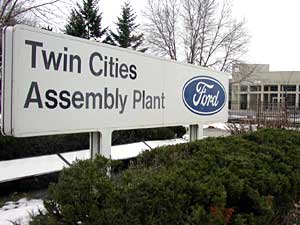|
Photos
|
 |
| Ford's Twin Cities Assembly Plant in Highland Park, St. Paul (MPR Photo/Marisa Helms) |
St. Paul, Minn. — Ford's sprawling assembly plant takes up about 140 acres in Highland Park, a neighborhood overlooking the Mississippi River, and home to some of the city's priciest housing.
Shawn Bartsh, President of the Highland Business Association says the plant's unlikely location surprises some people.
"When you try to explain to outsiders that this major industrial plant is in the middle of one of the loveliest neighborhoods in St. Paul, they hardly believe it," she says. "But you almost don't know it's there."
Bartsh has only good things to say about the plant as a neighbor and about Ford as a corporate citizen.
But sales of Ford Rangers made at the plant have been falling. They are down 23 percent for 2005. Ford's total vehicle sales fell five percent last year, and the company is under pressure to reduce its production capacity. So state and city officials are concerned Ford may quit the 80-year-old plant, eliminating nearly 2,000 high-paying jobs in the process.
Elected state and city officials are trying to convince Ford to stay. Governor Pawlenty and two aides met with company officials in Detroit yesterday, but received no commitments.
Minnesota Commissioner of Employment and Economic Development, Matt Kramer, admits officials are preparing for the worst.
"We don't want to think about it," he says. "But we have, because we have to, to be responsible to everyone. We're not going to be surprised. We're preparing for all contingencies."
The top priority for St. Paul Mayor Chris Coleman is preserving jobs at the plant.
"I think first of all, we have to start with the premise that there are almost 2,000 good-paying jobs on that site," Coleman says. "So that loss should be replaced somehow with equivalent jobs to the extent that we can."
Others are skeptical, including Jerry Trooien, president of the JLT Group, a local developer of large industrial and residential properties.
"I think that the odds of getting another manufacturer in there are extremely slim," says Trooien. "Extremely slim."
"I can't imagine 3M or what's left of our manufacturing around here would be going in to retrofit that building," he says. "Is it possible? Yes. Is it probable? Highly unlikely."
Trooien says the Highland Park neighborhood where the Ford plant sits has become more residential since Ford rolled out its first Model T there in 1925.
Highland Park has become one of the most sought-after residential locations in the city. It has a small town feel to it. Residents can walk to retail and grocery stores, a movie theater, restaurants bookstores and coffee shops.
The neighborhood has 27 blocks of riverfront property. The Ford plant takes up about eight of those blocks.
According to one neighborhood real estate agent, the majority of riverfront homes go for $500,000 to $800,000. The average Highland Park home costs more than $300,000.
Real Estate analyst Matt Boehlke with Grubb & Ellis|Northco in the Twin Cities says given the residential and retail nature of the community, he also doubts the site would become another industrial zone.
"Once it's redeveloped," he says, "they would probably do some kind of mixed use, have some type of residential housing, retail, possibly some office, but industrial probably would not exist in that mix."
Ramsey County places the value of the Ford site at more than $27 million. In 2005, the company paid slightly more than $1 million in property taxes.
Boehlke says the site would be worth more to the city as a residential site, because that would increase the tax base.
But for now, the state's focus is on retaining Ford and its 2,000 workers. Their current union contract guarantees those jobs through 2007.






